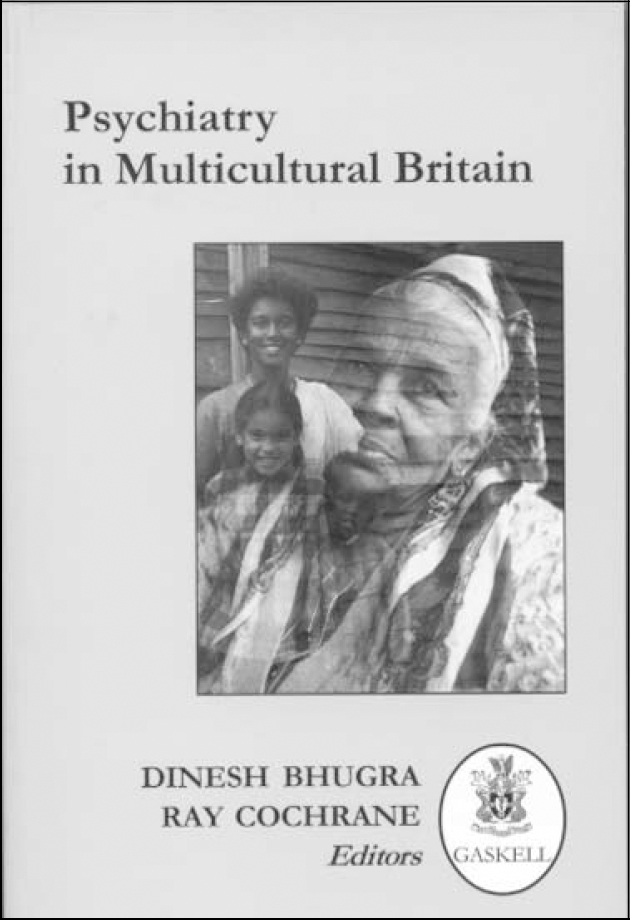Understanding Clinical Papers By David Bowers, Allan House and David Owens. Chichester: Wiley. 2001. 202 pp. £19.95(pb). ISBN: 0-471-48976-X
Psychiatry in Multicultural Britain Edited by Dinesh Bhugra and Ray Cochrane. London: Gaskell. 2001. 367 pp. £30.00 (pb). ISBN: 1-901242-45-5

The title of this book is a bold assertion of the fact of multicultural Britain. There are those, of course, for whom multiculturalism or the very idea of a multicultural society is anathema. Multiculturalism as an idea challenges the established order. For example, if we were to embrace the notion of multiculturalism, whose values will come to determine how society will be governed, whose values will hold sway even in domestic matters and whose etiquette and conventions will guide social practice in day-to-day life? There is inherent in celebrating multiculturalism the implicit assumption that all views will be equally valued and accepted. Convergence of values is not the goal of multiculturalism, rather multiculturalism, if it espouses any ideology at all, espouses the idea that all cultures are equally valuable but different. No hierarchy of values exists nor is there a unifying central view of how the good life will be lived. Thus, it is easy to see how some people will have come to perceive multiculturalism as the vanguard of chaos.
The question is how psychiatry in the West, in Britain in particular, will respond to the challenge of multicultural societies. This new book edited by Bhugra and Cochrane is a bold response to the many complex issues that multiculturalism raises. The editors set themselves a high standard indeed. Their aim is to ‘bring together the best of contemporary research and scholarship — both pure and applied — that is relevant to understanding the patterns of mental illness found in minority ethnic communities in Britain’. Furthermore they hope to stimulate debate about psychiatry as the now classic works by Rack (Reference Rack1982) and Littlewood and Lipsedge (Reference Littlewood and Lipsedge1982) did 20 years ago. In many respects they succeed in their goal. There are exceptional chapters but also not so good chapters; the variability in the quality of writing is a sign of a multi-authored text.
Littlewood's chapter on psychiatry's culture is as we have come to expect of him: surfeit with erudition, highly theoretical and well argued. His analysis of the terms ‘culture’ and ‘nature’ and of the uses and abuses of these terms is illuminating. But in the end, for the practitioner faced with the sharp reality of the clinic, there are few answers or guidance. Bhui's chapter on epidemiology and social issues draws our attention to the complex meanings and limitations of the terms ‘race’ and ‘ethnicity’. He gives an instructive example of Punjabis settled in Britain. Cochrane's chapter on race, prejudice and ethnic identity is an accessible guide to the experience of racial prejudice in Britain or elsewhere. It is particularly good at describing the possible influence of prejudice on self-identity and self-esteem. Bhugra and Cochrane's chapter, Mental illness and ethnic minority groups, gives a comprehensive summary of the epidemiology of psychiatric disorders in ethnic minorities. The chapters by Shah, Patel and Mirza on old age psychiatry taken together provide one of the best sources of the demography of ageing in minority groups. Nikapota's chapter on child psychiatry provides a wealth of clinical examples to illustrate how cultural practices may influence presentation of child psychiatric problems. It is an intelligent, flexible and humane approach to children and their families. Cope's chapter on forensic psychiatry is well written and full of information about ethnic minorities and the criminal justice system. She identifies the likely explanations for the over-representation of African—Caribbeans in the judicial and secure psychiatric setting.
This book will be of interest to all psychiatrists for its strength is that it focuses on what is most distinctive about psychiatry: the exploration and elucidation of the complexity of human life and psychology. A multicultural society challenges us to understand and tolerate what is peculiar about the other. That is of course the business of psychiatry.



eLetters
No eLetters have been published for this article.